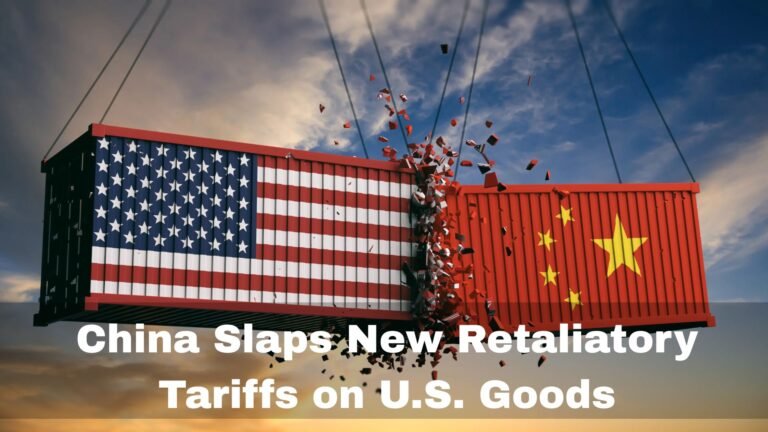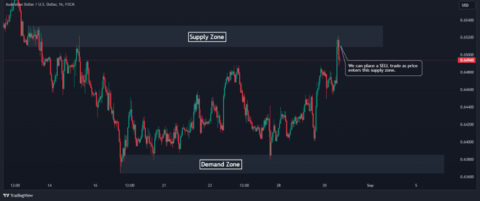In breaking news this morning, China has announced it is imposing new retaliatory tariffs on all U.S. goods. The additional tariffs amount to 50%, bringing the total tax on U.S. goods exported to China to 84%. This announcement comes after President Trump followed through on his earlier threat to impose new tariffs on Chinese imports, with the combined tariffs now reaching 104% as of midnight.
Stock Market Reaction
As the two countries engage in an escalating trade war, stock futures have been negatively impacted. Initially, the markets showed a mixed response, but they are now down across the board. Investors are bracing for another roller-coaster day in the markets, as Asia’s stock markets also took a hit in response to the new round of tariffs. With this new development, stock market futures indicate that the day ahead could be volatile.
White House Response
The White House has provided its initial reaction to China’s retaliatory tariffs. CNN’s business correspondent, Zain Asher, reports that China’s response is unlike that of most other nations. While reciprocal tariffs are common, China is taking a different approach in the trade war, given the large imbalance in trade between the two nations. China relies less on the U.S. than the U.S. relies on China, which is why it believes it can afford to wait out the situation.
The Chinese Strategy
China’s President Xi Jinping appears to have a long-term strategy, knowing that the American consumer will likely bear the brunt of these tariffs. The U.S. imports three to four times more goods from China than China imports from the U.S., making American consumers vulnerable to price increases. In addition, China has other strategies to protect its economy, including boosting domestic consumption and strengthening regional cooperation with other countries. There is also concern that China may flood the European Union (EU) with more goods, which could have a significant impact on global trade.
Strategic Timing
Mark Stuart, an expert on global trade, points out the timing of China’s retaliation, which often coincides with U.S. market openings. This could be an intentional move to exacerbate volatility and cause as much economic pain as possible. The European Union is also expected to respond, as they are voting today on how to retaliate to U.S. tariffs, particularly the steel and aluminum tariffs imposed earlier this year.
The EU’s Response
The EU has been slow to respond, partly due to its complex political structure, as it is a bloc of 27 nations. The EU needs to be strategic in its response to avoid backlash. For example, they are considering carving out American bourbon from their retaliation, which would prevent devastating effects on French, Italian, and Spanish winemakers. The EU’s delay is also a result of a careful approach to avoid undermining their negotiations with the U.S.
Impact on Global Markets
Markets across Europe have also reacted negatively to the escalating trade war. Stock indices in the EU are down significantly, with markets such as the Footsie 100 and CAC 40 seeing losses. The situation is becoming increasingly tense, and optimism in the markets is in short supply.
Economic Analysts Weigh In
CNN global economic analyst Rana Foroohar provides her perspective on the ongoing trade war. With China’s new tariffs, the situation has become even more chaotic. The real-world impact of these tariffs will take time to manifest, but it is expected that global supply chains will begin to shift as businesses adjust to the new reality. Products that rely heavily on Chinese imports will see increased prices as companies decide who will absorb the additional costs.
Immediate Market Reactions
The markets reacted poorly to China’s announcement, with stock futures dropping immediately by about one percent. If the markets close in this state, it could push the S&P 500 into a bear market. Investors are also increasingly concerned about the bond market, as bond prices have dropped, signaling that investors are not seeking out traditional “safe” investments as they normally would during periods of stock market instability.
The Bond Market Crisis
Rana Foroohar explains that the bond market’s current state is particularly concerning. Normally, in times of stock market turmoil, bonds and other safe assets, such as gold, should see rising demand. However, in the current environment, both bonds and gold are seeing price drops. This suggests that institutional investors are selling off safe assets to cover losses in other areas of their portfolios. The bond market’s behavior indicates broader concerns about the U.S. economy and the global economic landscape.
Reactions in the Retail Sector
As the trade war progresses, American consumers are starting to react by stockpiling goods. Many are purchasing items such as toothbrushes and cars in anticipation of price increases. Automakers, too, are adjusting their strategies, with some holding back on exports and hoarding supplies in response to the tariffs. These behaviors are typical of the early stages of a trade war, where disruptions to the status quo begin to take shape.
Long-Term Impacts on Prices
The impact of the trade war will be felt across various industries, with prices expected to rise. Perishable goods such as food and agricultural products will see immediate price increases due to the need for daily imports. More complex products, like cars and electronics, may take longer to see price hikes, as many retailers and manufacturers already have stockpiled components. In the longer term, as these stocks deplete, prices will inevitably rise.
Adjustments to Global Supply Chains
The global supply chain is undergoing significant changes as companies seek alternatives to China for their imports. Automakers, computer manufacturers, and other industries are exploring new sources for parts and materials to avoid tariffs. This represents a major shift in the global economy, and businesses are working quickly to adapt to the new realities of international trade.
Conclusion
The escalating trade war between the U.S. and China is creating uncertainty and volatility in global markets. As both nations impose increasingly punitive tariffs on each other’s goods, the impacts will be felt not just by businesses but by consumers worldwide. The situation remains fluid, with the potential for further disruptions in supply chains, higher prices, and a volatile economic environment for the foreseeable future.

Daniel J. Morgan is the founder of Invidiata Magazine, a premier publication showcasing luxury living, arts, and culture. With a passion for excellence, Daniel has established the magazine as a beacon of sophistication and refinement, captivating discerning audiences worldwide.





